Groundhog Day succeeds as a film because of the way it plays with, subverts, and outright mocks the tropes of each of the genres it flirts with. While some people would call it a time travel movie, or a movie about small town America, or the most spiritual film of all time, or a rom-com, it is by breaking the rules of each of those types of films that it ultimately transcends genre entirely.
Groundhog Day is not so much a time travel movie as a time loop movie; Phil Connors repeats his day over and over again. Here’s where this is problematic, narratively speaking: every time travel movie I can think of gives you rules, deadlines, a structure of some type—stakes. The Back to the Future trilogy sets its rules about how the DeLorean works, why you need to avoid your future/past selves, and what sort of fuel Doc needs, and then encounters scenarios where the DeLorean can’t get to 88mph or runs out of fuel, and Marty’s family starts fading out of existence. Looper shows us a terrifying web of cause and effect in one of the best body-horror scenes in film. Primer’s entire plot is about the byzantine limitations of time travel; the title really could have been Consequences. Even Bill & Ted take the time for the “just remember to leave the keys in the bush” sequence. But Groundhog Day doesn’t bother with any of this—explanations that are basic to a time travel film, or a time loop film, are just skipped. How is it happening? Why? What’s at stake? Is there a deadline for Phil’s transformation, or could this just go on until the sun dies? We’re left to our own thoughts for these basic questions.
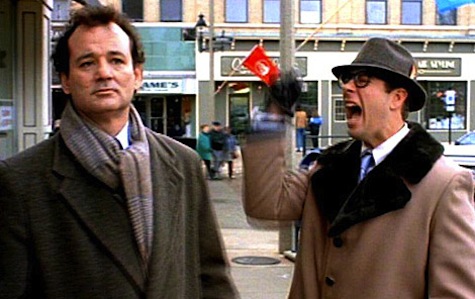
What we get out of time travel/loop rules is worldbuilding. Except…wait for it…the film does that all wrong, too. In an appreciation of the film for its 20th anniversary last year, The Guardian quoted Terry Jones: “What’s so remarkable about it is that normally when you’re writing a screenplay you try to avoid repetition. And that’s the whole thing here, it’s built on repetition.”
We learn about Punxsutawney and its people slowly, and the film isn’t afraid to test our patience. By about the third iteration, you really want to skip through the morning routine, the encounters with Mrs. Lancaster and Ned, the ridiculous folksy groundhog shtick, but you can’t. And possibly, briefly, you’re on Phil’s side: everyone he meets is annoying. Mrs. Lancaster and her banal attempts at chit-chat (who tries to talk about the weather with a weatherman? Come on.), Rita’s constant chirpiness, Gus’s obvious joke about his name (“Phil? Like the groundhog Phil? Watch out for your shadow there, pal!”) These people are cardboard cutouts designed to irritate us.
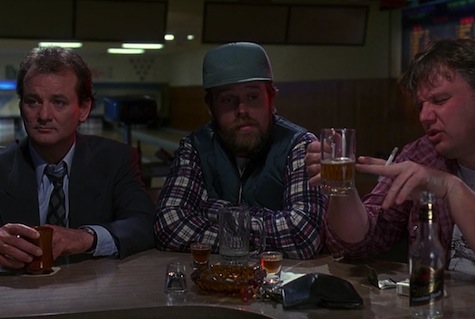
And yet. As the film progresses, they’re all revealed to have complex inner lives, dreams, and depth. (There is one character who is completely unchanging. But we’ll get to him later.) Gus? The one who gets drunk at a bowling alley, and tries to see his glass of Miller Draft as half-full? He’s a former Navy man, he hates his life in Punxsutawney, and he wishes he’d stayed in the service. Doris, the gum-popping waitress? She dreams of visiting Paris. Not even living there, just getting to see it. Even poor Ned Ryerson is so desperate for validation that his big sale to Phil qualifies this Groundhog Day as “the best day of [his] life.” And endlessly upbeat Rita? She studied French poetry in college before settling for a second-rate TV station in Pittsburgh, and “everyone knows” that she wanted more out of life.
But the next two things are, to me, the crux of this film. First, Phil Connors is not your usual protagonist, and second, it’s just about the most secular “spiritual” movie I can think of.
So, to tackle that first point: Phil Connors is not a very good romantic comedy lead, and he’s really bad at being in “spiritual” movie. And for all that he changes, there is a certain core to him that remains.
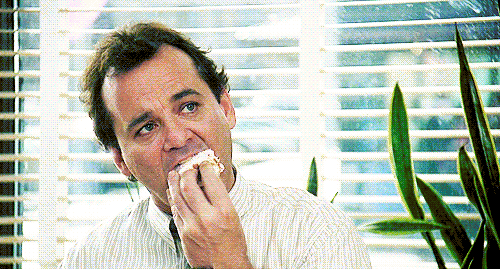
Apparently during filming, Murray would go to Harold Ramis before a scene and simply ask, “Good Phil or bad Phil?”—but it’s far more complex than that. Yes, Phil grows and changes, learns how to play the piano, sculpt ice, and genuinely care for other people, but just as important is that he never loses his sharpness. After he saves the kid in the tree, he yells at him for never thanking him, and then says, “See you tomorrow. Maybe!” in exactly the sneering voice kids use on each other. Having saved Buster from choking to death, he teases him for “trying to swallow a whole cow.” He steps into his new day and his new life, with Rita beside him, and says, “Let’s live here!” but after thinking for a second while they kiss, adds, “We’ll rent to start.” (Has there been a more perfect closing line in film history, since “Nobody’s perfect.”?) This is no manic conversion, or blathering protestation of joy: Phil Connors is still kind of a dick.
This is what makes this film work better as a redemption tale than any Christmas Carol, or even Murray’s own Scrooged. Many people have compared GD to Carol and It’s a Wonderful Life, and there’s been a groundswell over the last few years to talk about this film as religious, spiritual, Buddhist, etc. Now, I’d love to stand here and spend the rest of this post defining spirituality in film…but I’m not going to. I’ll let other people define it. Michael Bronski, film critic for The Forward, compares the groundhog to the resurrected Christ, while for others Phil Connors’ journey serves as a handy example of boddhisattvaism.
Director Harold Ramis has mentioned getting letters from Jesuits, Buddhists, and rabbis (presumably written while they were all hanging out at a bar together) about how the film reflects different religious beliefs. It was featured in MoMA’s Faith on Film retrospective, and both Ramis and the screenwriter, Danny Rubin, are asked about their own faiths in interviews. The film has even inspired something of a cult—it boosted the yearly pilgrimage to Punxsutawney, Pennsylvania, site of the country’s most famous groundhog festival, and also kickstarted a rival groundhog festival in Woodstock, Illinois, where the movie was filmed.
And yet. There is usually a certain structure to the religious film, or the Christmas Carol-inspired film. We are introduced to a person who has lost his way, spiritually speaking; he is scared or cajoled into becoming a better person (usually under the care of some sort of magical guide); he asks for forgiveness. Only then does he get to return to normal life, changed by his experience. None of this applies in Groundhog Day. Phil is never given any rules. There are no Ghosts of Groundhog Day Past, or Clarence, or Virgil, to tell him what’s expected of him. The film drops some fairly large hints that Phil and Rita are both Catholic, but Phil never pursues any sort of spiritual counseling or asks for absolution, and the only prayer in the film is the mocking wish for world peace at the bar. He is left to figure everything out on his own, as is the audience, and none of us even know why the last iteration worked.
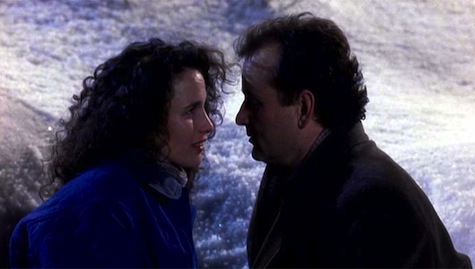
Groundhog Day is a romantic comedy in which the main character is not transformed by love.
Yes, Rita’s a good influence. She won’t sleep with him, which gives him a goal to pursue as he’s getting used to his time loop. Her optimism inspires him to turn purgatory into a self-improvement course. Her love of people helps him see the people of Punxsutawney as more than just hicks. However, Rita’s love is not, ultimately, what transforms him into a better and more caring person, which leads us to the last rule Groundhog Day breaks…
In the end, Groundhog Day breaks the ultimate theatrical rule by being a comedy about death.
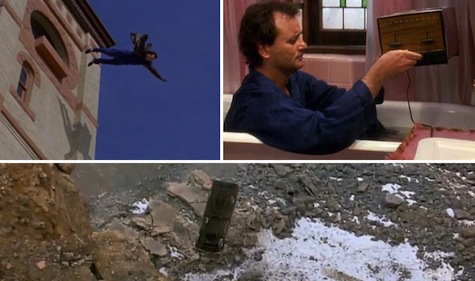
In the trailer for the film, the suicide montage is played for laughs, and initially the film follows this script. Phil steals his rodent namesake and drives into a limestone quarry with him. The humor of the scene is underscored with goofy music and Chris Elliot there to film the spectacular crash. (After the truck explodes for the second time, you can hear the groundhog’s death-squeak.) When Phil wakes in the morning, and realizes not just that he’s lived, but that it’s still February 2nd he simply moans “Awww, nuts…” like a disappointed 10-year-old, and flops back into bed. Still funny, right?
Next, Phil takes a toaster in the bathtub, steps in front of a truck, and swan dives off a bell tower. And here it shifts, because Rita and Larry have to identify his body, and the camera lingers on Phil’s face. After the parade of suicides—which could be read as comic—they take the time to show us Phil’s corpse.
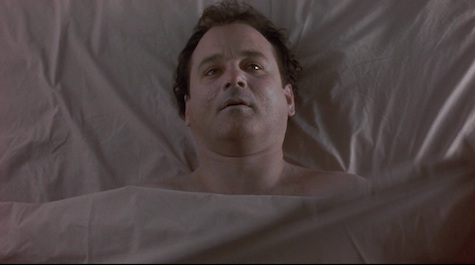
This is real. He’s really dying each of these times, and people are having to deal with finding his dead body each day in their own realities, which are not resetting. What self-respecting comedy shows an audience the reality of death?
And it gets worse in the diner setpiece:
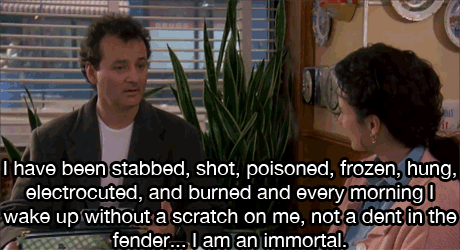
The only one of these we saw was the electrocution, but… Phil froze himself to death? He stabbed himself? This is elegant shorthand to let us know how much this character hates himself. But, since it’s framed within the “I’m a god” conversation, it stays comparatively light. Rita puts Phil on a healthier path, and he begins to be a better person. But then…remember when I mentioned the Character Who Doesn’t Change?
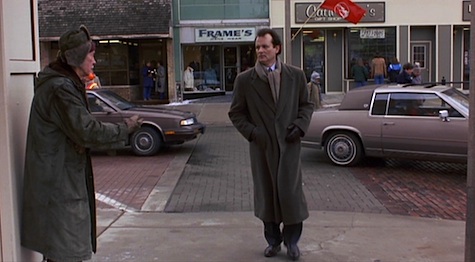
That would be Pops. Pops, the elderly homeless man begging for change on what is now designated “Ned’s Corner” in Woodstock, Illinois. Every time we see him he’s standing on that corner. On day three, in fact, when Phil has realized he’s trapped and the fear has begun to set in, he recoils away from him with a yelp of terror. Then, once he’s settled into his life of eternal return, he actually mocks Pops, saying, “Catch you tomorrow!” as he blows past him. In my opinion that’s the most important line of the movie, as Phil is breezily announcing his intention to ignore compassion, responsibility, even death itself, for as long as possible.
After Rita’s peptalk, Phil wakes up resolved to live a better life, and one of the big signs of his change is that he give Pops a huge wad of cash. Then we see Phil reading, learning piano, sculpting angels out of ice, and generally becoming awesome. I still remember that when I first watched GD on TV when I was a kid, I assumed we were almost at the end: Rita would fall in love with him, and it would end with them kissing on February 3rd.
But.
A few scenes later, after Buddha-only-knows how many months of self-improvement, Phil sees Pops alone in the cold, and goes a step beyond charity to personally bring him to a hospital.
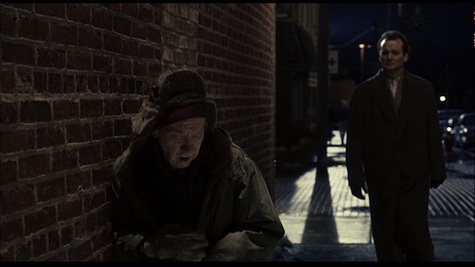
When he learns that the old man died, and is told by the nurse that “it was just his time,” he refuses to accept it and embarks on a new montage—this time trying to hold death off with money, food, warmth, anything he can think of, in a touching parody of the excess of the earlier diner scene, and his own parade of suicides.
Of course none of it works. Phil wants to control life itself, and become the god he claimed to be, but in the end, he’s left in an alley, holding Pops while he dies, and is left to stare into an empty sky, watching Pops’ last breath drift away.
In all of these scenes Pops never changes, never has any lines, no personality of his own, because he is Death. He is the reality of time, and finiteness, that Phil has to accept before he can return to life. It is only after the final death that we see Phil really shift in his attitude toward life, and even winter. Earlier he intones, “It’s gonna be cold, it’s gonna be grey, and it’s gonna last you the rest of your life,” but now he delivers a truly inspiring speech for Groundhog Day. “Standing here, among the people of Punxatawney, and basking in the warmth of their hearths and hearts, I couldn’t imagine a better fate than a long and lustrous winter.”
We see that Phil has changed by how he spends his day helping the people of Punxatawney. He can’t save Pops, but he can make his last day a little warmer. He can make sure the kid doesn’t break his neck falling out of the tree, that Buster the Groundhog Poo-bah lives to see February 3rd, and that a young Michael Shannon can attend Wrestlemania with his new bride. Winter itself is transformed, because he’s learned to look at it differently, and Phil has become a new person.
In the end, we have a romantic comedy that’s not about whether the boy gets the girl. We have a spiritual movie that never tells us why the hero gains his redemption. We have a vision of small town America that makes us want to flee back to the loving arms of urban Pittsburgh. (OK, that might just be me…while I’ve come to love the people of Punxsutawney, I don’t think I could handle living there.) We have a time loops movie that doesn’t give us a single clue about its structure. And finally, we have a comedy that hinges on death, but remains so fucking wonderful that people are willing to suffer through multiple exposure to “I Got You Babe” to watch it every year.
Leah Schnelbach sure as heckfire loves this movie, and she uses Twitter! Sometimes.










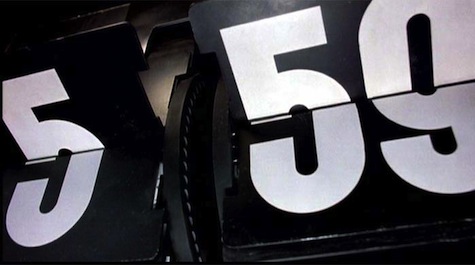
I just rewatched the other night, always a pleasure.
I have always thought the the film was about how time travel and foreknowledge allow for the reversal of entropy, as Phil becomes the guardian angel of the town.
Two things I really like about the movie is that culture, learning, and kindness are shown as the way to a better life and makes each day worth living.
The other is that, like in IT’S A WONDERFUL LIFE, every little thing we do expands out like a pebble in the water to affect others so kindness is a good thing.
I think that the spiritual aspect of Groundhog Day that appeals to viewers is tied into Phil’s lines about God, particularly my favorite: “Well, maybe the *real* God uses tricks, you know? Maybe he’s not omnipotent. Maybe he’s just been around so long he knows everything.” That musing about God’s long existence being his secret ties back to Phil’s comment about now being immortal (“I am god, not The God, I don’t think”). Phil is thus God’s replacement, the mortal who steps in while God is out (as in Bruce Almighty, albeit more subtly) and discovers just what the nature of Godhead is.
And, by limiting the Divine, the movie makes the ineffable at once more understandable and sympathetic, if no more desirable. We pity God’s loneliness as demonstrated by Phil’s isolation, trapped in his time loop.
Phil is restored when he surrenders his ambitions to be God, both the little tin god he was at the start, and the more benevolently smothering God he becomes. And what Phil discovers is the healing bonds of community. Even if it is only leased, to start.
I never realized until now that it never bothered me that they never explained why or how he got stuck in a time loop. And yet, that damn mailbox in “The Lake House” pisses me off to no end. Truly a testament to the quality of each movie.
Did you ever read Doubled and Redoubled by Malcolm Jameson. It can be found in an old anthology of stories from Unknown, a cleection edited by DR Benson. This story dates from the early 1940s and is a dead ringer for the plot of Ground Hog Day. I have often wondered if the writes for the film had ever seen it.
I think you are making the same mistake as Rita when you say that –
‘He’s really dying each of these times, and people are having to deal with finding his dead body each day in their own realities, which are not resetting.’
– You’re assuming that his death would reset the day (just as she assumes midnight) whereas it is the time of 6:00 that is the only known cause. Reality keeps on going regardless of his actions, living or dead, until it is time to bounce back.
PS The sun won’t burn out if it resets every day.
Obviously, the only reason Phil escapes is that he bought a large life insurance package from Ned Ryerson. Finally, full coverage.
From the very first time I saw it, I just assumed that it was a day that Phil had to “get right.” Clearly, Rita was a big part of that. But I feel like he should have been getting to know the town during all of the visits. He should have developed some talents, outside of sarcasm, during his life. He should have been the person that Rita wanted to bid on and take home. He just needed a lot of time to become that person.
One mistake that stood out to me was when Phil played the piano on the final day, and his teacher proclaimed him to be her best student. But as far as she was concerned, he’d just walked in that day and could play miraculously, so why she thought she taught him anything is anyone’s guess.
I like your comments on this, but I do think that Rita kind of sets the guideline for his final day when she starts listing off all the things she finds attractive and is looking for. It’s about half way through the movie in the diner. “Humble, intelligent, funny, romantic, kind, plays an instrument.” I abreviated a bit, but that’s pretty much what he becomes by the end when the day stops repeating.
Also to Quasarmodos comment. I think Phil keeps pretending not to know anything about the piano whenever he first shows up for the lessons, then “quickly” learns how to play, getting better and better each time. At least that’s the only way I made sense of it.
Each year I proudly wear my “It’s Groundhog Day AGAIN!” shirt on Feb 2nd. Groundhog Day has been a favorite movie since it was released. I can’t wait to watch it again.
My take: the last iteration works because he has finally let go, and become a self-contained person. He needs no-one and nothing to complete him. At the same time, he has learned/intuited, like Jacob Marley, that Mankind is his business. It is no longer of paramount importance to him to get Rita, or even to escape from that particular day. Wherever he is, that’s home, because he himself has become all he needs to feel happy, and that’s why life starts to move on again. Up until that final iteration, there is something incomplete/immature about him as a human being. As for the snarky side of him, it’s possible to be that way, but with an undertone of lovingness, rather than nastiness. There’s a whole city renouned for its gentle and therefore funny insults.
Well, it’s a good flick. Sometimes a thing is just a thing. I honestly didn’t read any religous symbolism into this movie. One thing I did take away is the commentary on Monday to Friday, 9-5 life. We get up, do our morning ritual, head off to work, work like heathens, go home, eat, cry, go to sleep. Get up, rinse, repeat. Our life is immitating art over here. This movie and Office Space really points out how the Zombie Apocalypse is happening now. Right now. Here. On Earth. And no toaster is going to save us.
Woof™.